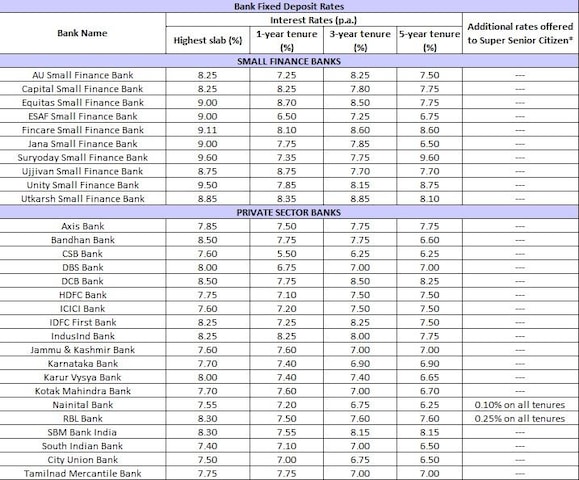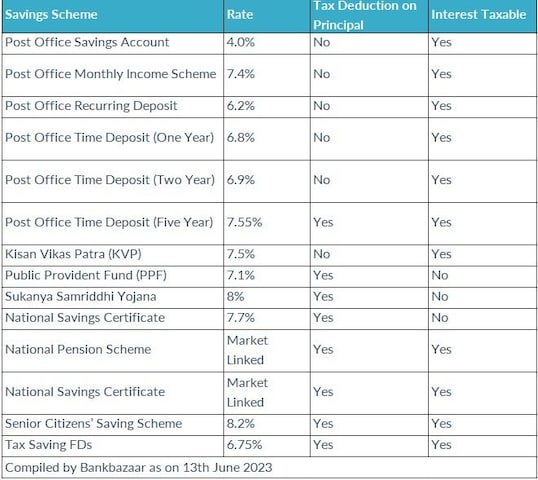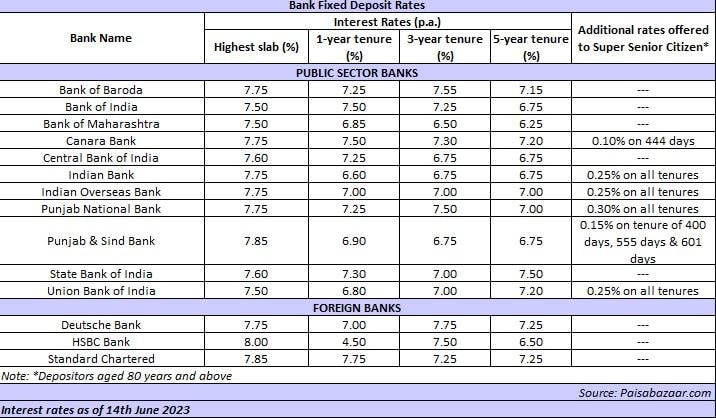Now that interest rates are peaking, investors, especially senior citizens are looking to park their funds. Bank fixed deposits (FDs) and small savings schemes are two low-risk investment options for those who prefer the safety of their capital. Compared to fixed deposits, which are provided by banks, small saving schemes are managed by the government and come in a variety of forms.
India Post provides several deposit options for investors, known as post office saving schemes. These small saving schemes include Public Provident Fund (PPF), Sukanya Samriddhi Yojana (SSY), National Savings Certificate (NSC), Post Office Time Deposit, and Senior Citizen Savings Scheme (SCSS). The government keeps revising the interest rates on a quarterly basis. During the Union Budget 2023, Finance Minister proposed to double the deposit limits for Senior Citizen Savings Scheme (SCSS) and also introduced a new small savings scheme—Mahila Samman Savings Certificate.
Here is the interest rate being offered by various government schemes:
So, while deciding between the two, what should senior citizens consider?
Senior citizen investors have additional choice of investing in government of India’s Senior Citizen Savings Scheme (SCSS) which offers 8.2% interest currently and as announced in budget, an investor can invest upto Rs 30 lakh.
” A senior citizen couple can invest Rs 60 lacs which may help get around Rs 40,000/- per month. Interestingly, in last two years, interest rates on bank FD has seen around 200 bps improvement when RBI increased rates by 250 bps but if you look at interest being offered on SCSS, it has seem movement of only about 80 bps, which means SCSS rates do not decline as drastically as bank FD rates would be,” said Bhavik Thakkar CEO Abans Investment Managers.
In the last two policy meetings, RBI has not hiked rates and chances are that by H2 FY24, there may be interest rate cut. So, one thought could be lock in current high rate for as long as possible.
Here is a comparison of the interest rates offered by major banks for FDs.
FD rates for senior citizens provided by small banks and private banks. Data compiled by Paisabazaar for 14 June, 2023

Below is the FD rates for senior citizens provided by public and foreign banks, according to data compiled by Paisabazaar.
Age and investment amount
The minimum age requirement for opening an SCSS account is 60 years or 55 years old if one has retired under a superannuation, voluntary retirement scheme (VRS). If we talk about the tenure under the said scheme, the same is for a period of five years which can be extended for a further period of three years. While the SCSS allows a maximum amount of Rs 30 lakh, the banks offer investments upto Rs 2 crores under FDs., thus having an upper hand over such saving schemes as the same help in sustaining an easy retired life.
“In case of bank FDs, banks set 60 years as the cut-off age for availing higher interest rates available to senior citizen FD rates, with a few banks offering additional interest rates to super senior citizens, i.e. those aged 80 years and above. While SCSS can be opened by individuals aged above 60 years, a 5-year concession in the minimum age criteria is offered to retired civilian employees provided they open their SCSS account within 1 month of receiving their retirement benefits. The minimum age criteria for retired defence employees is 50 years provided they open the SCSS account within 1 month of receiving their retirement benefits. Thus, SCSS allows many retired individuals an option to earn higher returns from their retirement benefits, which is otherwise unavailable through bank FDs,” said Naveen Kukreja, Co-Founder and CEO, Paisabazaar.
Small savings schemes are government backed, bank FDs are not:
A bank FD is insured only up to Rs 5 lakh, including principal and accumulated interest, per accountholder, per bank. SCSS is a far safer avenue to park a large sum (Rs 15 lakh or the retirement amount, whichever is lower) since the Government directly backs it.
“Small savings schemes are government-backed investment options that offer guaranteed returns. There is a variety of such schemes, offering varying benefits, which you can explore and apply for through post offices and banks. Fixed deposits, on the other hand, are a low-risk scheme but without government-backing. You can open a fixed deposit at most banks and financial institutions, which offer this facility at varying interest rates. Before putting your funds in an FD, consider your risk appetite and financial goals. Also make sure to compare FD rates before investing,” said Adhil Shetty, founder of BankBazaar.com
Liquidity
In terms of liquidity, small savings schemes are generally less liquid than FDs. This is because small savings schemes usually come with a lock-in period and premature withdrawal restrictions, which make it more challenging for you to access your funds in an emergency. Fixed deposits usually offer greater flexibility in comparison, though at a penalty, when it comes to accessing funds.
Taxation:
Investments in SCSS qualify for tax deduction under Section 80C. “While depositors can also open tax saving bank FD schemes to save tax under Section 80C, the interest rate of SCSS beats tax saving bank FD rates by a wide margin, except for a few banks like Suryoday Bank, DCB Bank and Fincare Bank,” said Naveen Kukreja, Co-Founder and CEO, Paisabazaar.
“The interest earned under SCSS is not tax-free, but deposits in SCSS qualify for deduction under Section 80C of the Income-tax Act, 1961 for up to Rs 1.5 lakh. Investors can get income tax deductions for bank FDs with five years or more tenure. The interest from SCSS is taxed at income tax slab rates, as is the case with FDs,” said Sandeep Bajaj, Managing Partner, PSL Advocates & Solicitors.
Interest rates: Among all the small savings schemes, Senior Citizen Savings Scheme (SCSS) offers the highest interest rates to senior citizens. The scheme offers 8.2% p.a. for 5-year tenure, which beats the 5-year senior citizen FD rates of PSU banks and large private sectors banks by more than 100 bps, said Kukreja. Only a couple of small finance banks like Suryoday Bank, Unity Bank, DCB Bank and Fincare Bank offer higher FD interest rates to senior citizens than the SCSS rates. And while it is true that certain small finance banks are offering 9 percent returns on FDs, these are still taxable by law and less safe than small savings schemes.
“The senior citizen savings scheme (SCSS) is one of the best fixed-income investment avenues for senior citizens looking for capital conservation and moderate appreciation. It provides quarterly interest. For the April-June’23 quarter, the interest rate provided by SCSS is 8.2% per annum, much higher than approximately 7.75% offered by top private banks for a 5-year term fixed deposit for senior citizens,” said Ajinkya Kulkarni, Co-Founder and CEO, Wint Wealth
“It should be noted that the deposit rate offered by an FD decreases as its liquidity increases relative to an investment in SCSS. FDs only give you the interest income along with the principal at the maturity of the deposit period, whereas interest from SCSS can be received every quarter,” said Bajaj.
Cap on investment
The one aspect where SCSS lags behind the bank FDs is the cap on total investment. While an individual can open multiple SCSS accounts, his total investment in SCSS cannot exceed Rs 30 lakh. In case of bank FDs, there are no upper caps on the total FD exposure for the depositors. Thus, senior citizens having investible surplus in excess of Rs 30 lakh would have to consider bank FDs or other investment options to park their surplus.
Capital protection and income uncertainty
In case of capital protection and income certainty, SCSS scores higher than bank FDs. Being managed by the Union Finance Ministry, SCSS depositors are covered under sovereign guarantee, the highest form of capital protection and income certainty available to any investor/depositor in the country. In case of bank FDs, cumulative bank deposits (including FD, RD, savings account and current account) of up to Rs 5 lakh of each depositor maintained with each scheduled bank is covered under the depositor insurance program from DICGC, an RBI subsidiary. Thus, individuals seeking higher protection for their bank FDs can spread their FDs across multiple scheduled banks in such a manner that their cumulative bank deposit with each of those scheduled banks does not cross Rs 5 lakh.
Exit charges
Exit charges from SCSS vs Bank FD vs Small Finance Bank could be another determinant for an investor to choose if he is looking to invest for short term. “SCSS charges 1.5% in 1st year and 1% in 2nd year for pre-mature withdrawal whereas banks offer lower inter rates if not levy charges,” said Bhavik Thakkar, CEO Abans Investment Managers.
What is the right strategy for senior citizens?
“Since SCSS has a mandatory 5-year lock-in and premature withdrawal penalties, senior citizens should park their mid-term cash flow requirements in smaller FDs with multiple banks. For example, if a senior citizen receives Rs 30 lakh at retirement, she can open an SCSS account to park Rs 15 lakh for five years (with an option to extend it for another three years). She can split the remaining Rs 15 lakh across 2-3 FDs (less than Rs 5 lakh, including principal and accumulated interest) across 2-3 banks, depending on future liquidity requirement,” said Kulkarni.
Illustrations offered by Bajaj include:
• A 65 year old man wants to invest Rs 70 lakh, he can opt for FD over SCSS or any other Small Saving Schemes as they have an amount restriction of Rs 30 Lakhs
•A 61 year old man wants to invest Rs 27 lakh that he has received as gift from a non relative. He can opt for SCSS over FD as deposits of SCSS can be claimed under tax deductions.
• A 70 year old man who has no other source of Income but has Rs 25 lakh to invest can opt for SCSS over FD as the payment of interest (around Rs 2 lakh ) per quarter rather than at the time of maturity. The Rs 2 lakh per quarter breaks down to somewhere around Rs 66000 a month, which is sufficient for survival.
In short, senior citizens with an investment horizon of 5 years, who are seeking regular income at quarterly intervals and/or wishing to save tax under Section 80C would find SCSS more attractive than bank FDs due to their higher interest rates.
Exceptions would be Suryoday Bank, DCB Bank, Unity Bank and Fincare Bank, which offer higher interest rates than SCSS.
“SCSS also allows some retired individuals to avail higher interest rates before reaching the age of 60 years, provided they open their SCSS accounts within a year of receiving their retirement benefits. The only major disadvantage of SCSS is the cap of Rs 30 lakh on maximum investments allowed for each depositor. Individuals having investing surpluses exceeding Rs 30 lakh would have to consider banks FDs, debt funds or other investment options for parking their surpluses,” said Kukreja.
Shetty believes that if you are investing for specific long-term goals, such as your children’s education or marriage, small savings schemes may be the ideal option. Fixed deposits are better suited for short-term goals, such as opening a small business, funding your foreign trip, or purchasing a vehicle.



 Loan, Personal Loan, Home Loan, Business Loan,Loans in India Loan in India, Personal Loan, Home Loan, Business Loan, Loans in India,Loan Finance,Loan in India, Get Instant Personal Loan,Home Loan, Business Loans in India
Loan, Personal Loan, Home Loan, Business Loan,Loans in India Loan in India, Personal Loan, Home Loan, Business Loan, Loans in India,Loan Finance,Loan in India, Get Instant Personal Loan,Home Loan, Business Loans in India